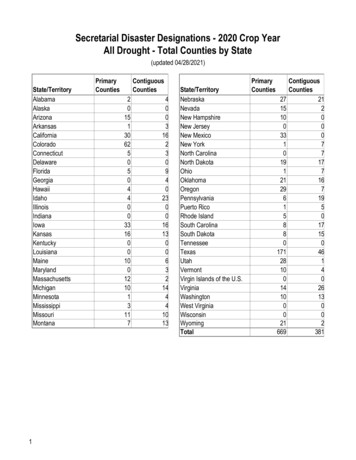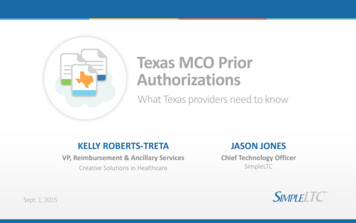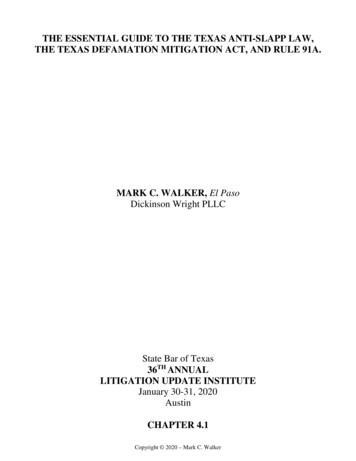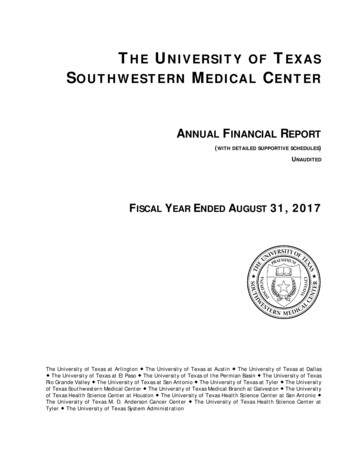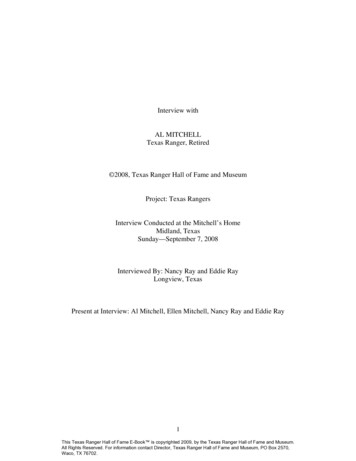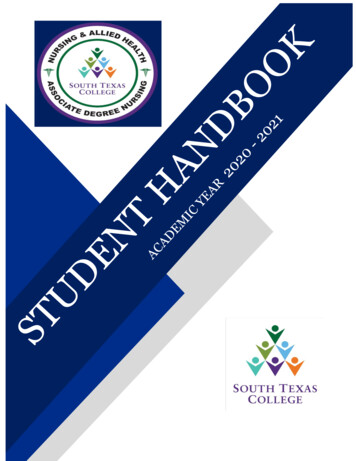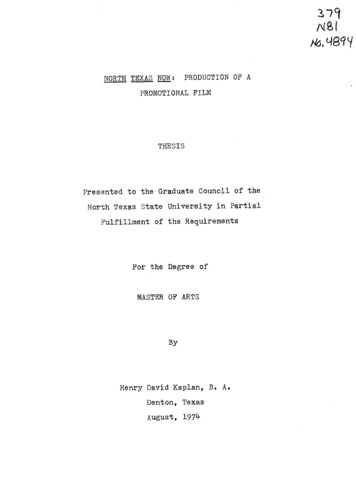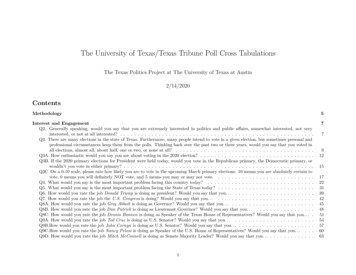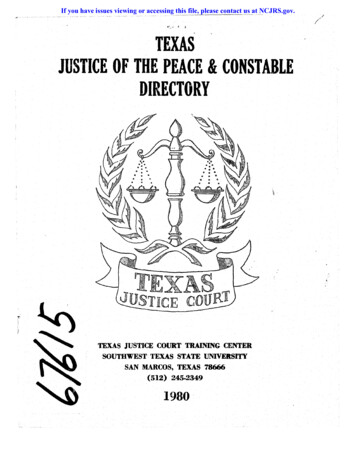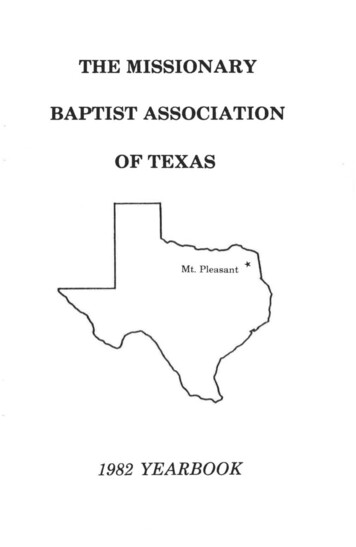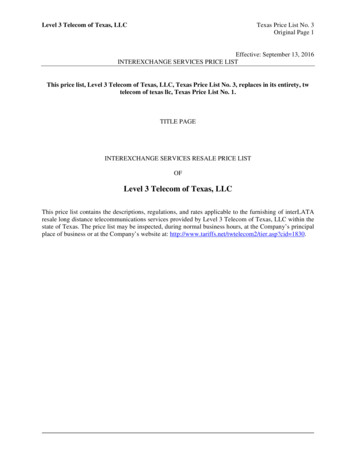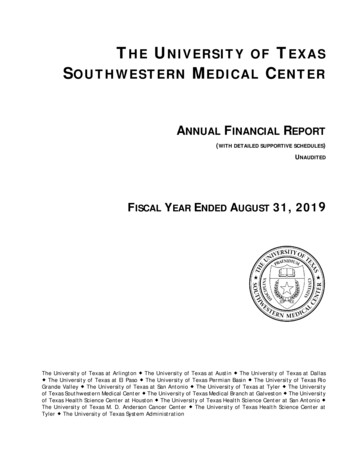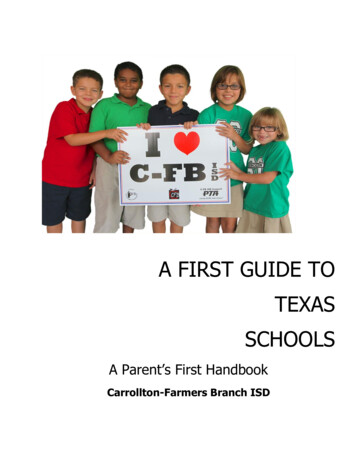
Transcription
A FIRST GUIDE TOTEXASSCHOOLSA Parent’s First HandbookCarrollton-Farmers Branch ISD
A First Guide To Your Children’s SchoolsA Parent’s First HandbookDeveloped by the Departments of Language Services, StudentServices, Counseling & Communications ofCarrollton-Farmers Branch Independent School DistrictTexas
ACKNOWLEDGEMENTSA Guide to Texas Schools, a Parent’s First Handbook is the result of collaborationamong the following people in the Carrollton-Farmers Branch Independent SchoolDistrict, Texas:Jennifer Adams, Elementary CounselorNikki Fisher, Secondary CounselorDr. Pat Franklin, Director of Student ServicesPam Pena, Strategic Communications ServicesGeorgina Tezer, Language ServicesThe idea for this first Handbook for families grew from consulting A Guide to YourChildren’s Schools, A Parent Handbook produced by the State of Illinois.We wish to thank Beth Robinson of the Illinois State Board of Education, the AdultLearning Center, and the Illinois Department of Human Services for allowing us toadapt their ideas and material to our needs. Their funding for the development of theirHandbook came from the Federal Refugee Children School Impact Grant.We also thank the Minnesota Department of Education who allowed the Illinoisagencies to adapt material from A Guide to Minnesota Schools for Parents of LEPStudents by Bounlieng Phommasouvanh, Mary P. Diaz, Diane Pecoraro, and Joyce M.Biagini.Thanks to Tatyana Fertelmeyster, Trudi Langendorf and Joy Ross for their insights andrecommendations in the development of A Guide to Your Children’s Schools, A ParentHandbook developed in Illinois.Material for the above Illinois Handbook was also taken from Parents as EducationalPartners: A School-Related Curriculum for Language Minority Parents by LauraBercovitz and Catherine Porter, the Adult Learning Resource Center.
THIS HANDBOOK IS FOR YOU!Welcome to Carrollton-Farmers Branch Independent School District, or CFB-ISD, whereour goal is high achievement for all students!This handbook was created to provide you with important information about our schooldistrict and about public education in Texas.In the United States parents are an essential part of their child’s education. Thishandbook will make it easier for you to understand how our schools operate. It will alsointroduce you to opportunities to participate in your child’s school community.We consider our parents to be our strongest partners. The most successful studentshave parents who support and encourage their child’s education.We hope this handbook will be a helpful guide to what is needed for your child to dowell and to be happy in his/her new school environment.
Carrollton-Farmers Branch ISD Directory of SchoolsELEMENTARY SCHOOLSDave Blair972-968-100014055 Heartside Pl.Farmers Branch, TX 75234L. F. Blanton972-968-11002525 Scott Mill Rd.Carrollton, TX 75006Carrollton972-968-12001805 Pearl St.Carrollton, TX 75006Central972-968-13001600 S. Perry Rd.Carrollton, TX 75006Country Place972-968-14002115 RaintreeCarrollton, TX 75006Dale B. Davis972-968-15003205 Dorchester Dr.Carrollton, TX 75007Farmers Branch972-968-160013521 Tom Field Rd.Farmers Branch, TX 75234Bernice Chatman Freeman972-968-17008757 Valley Ranch Pkwy. W.Irving, TX 75063Furneaux972-968-18003210 Furneaux Rd.Carrollton, TX 75007R. E. Good972-968-19001012 Study Ln.Carrollton, TX 75006E. L. Kent972-968-20001800 W. Rosemeade Pkwy.Carrollton, TX 75007Tom Landry972-968-2100265 Red River TrailIrving, TX 75063Las Colinas972-968-22002200 Kinwest Pkwy.Irving, TX 75063McCoy972-968-23002425 McCoy Rd.Carrollton, TX 75006Charlie McKamy972-968-24003443 Briargrove Ln.Dallas, TX 75287Neil Ray McLaughlin972-968-25001500 Webb Chapel Rd.Carrollton, TX 75006Kathryn S. McWhorter972-968-26003678 Timberglen Rd.Dallas, TX 75287Annie H. Rainwater972-968-28001408 E. Frankford Rd.Carrollton, TX 75007Riverchase972-968-2900272 MacArthur Blvd.Coppell, TX 75019Rosemeade972-968-30003550 Kimberly Dr.Carrollton, TX 75007
Donald H. Sheffield—Primary Campus972-968-310018111 Kelly Blvd.Dallas, TX 75287Ted Polk972-968-46002001 Kelly Blvd.Carrollton, TX 75006Donald H. Sheffield – Intermediate Campus972-968-320018110 Kelly Blvd.Dallas, TX 75287HIGH SCHOOLSJanie Stark972-968-330012400 Josey Ln.Farmers Branch, TX 75234Nancy H. Strickland972-968-57003030 Fyke RoadFarmers Branch, TX 75234June R. Thompson972-968-34002915 Scott Mill Rd.Carrollton, TX 75007MIDDLE SCHOOLSCreekview972-968-48003201 Old Denton Rd.Carrollton, TX 75007Early College High School972-968-62003939 Valley View Ln.Farmers Branch, TX 75234Ranchview972-968-50008401 Valley Ranch Pkwy. E.Irving, TX 75063Newman Smith972-968-52002335 N. Josey Ln.Carrollton, TX 75006Charles M. Blalack972-968-35001706 Peters Colony Rd.Carrollton, TX 75007R. L. Turner972-968-54001600 Josey Ln.Carrollton, TX 75006Barbara Bush972-968-3700515 Cowboys Pkwy.Irving, TX 75063CENTERSVivian Field972-968-390013551 Dennis Ln.Farmers Branch, TX 75234Dan F. Long972-968-41002525 Frankford Rd.Dallas, TX 75287DeWitt Perry972-968-44001709 Belt Line RdCarrollton, TX 75006Mary Grimes Education Center972-968-56001745 Hutton Dr.Carrollton, TX 75006Marie Huie Special Education Center972-968-58002115 Frankford Rd.Carrollton, TX 75007Bea Salazar School972-968-59002416 Keller Springs Rd.Carrollton, TX 75006
TABLE OF CONTENTSI.II.III.IV.THE SCHOOL SYSTEM IN TEXAS11.2.3.4.5.12244How are schools organized in my city?What is a “Title” School?What are the grade levels in schools in Texas?What happens after high school?Are there schools for students who don’t finish high school?ENROLLING IN SCHOOL61.2.3.4.5.6.667899How do I know where to enroll my child in school?What documents do I need to enroll my child in school?What immunizations does my child need to go to school?Where can I take my child for immunizations and basic medical services?What if my child had these immunizations before?What medical evaluations are done at school?THE SCHOOL DAYSCHOOL BUSESTHE SCHOOL CALENDARCOMMUNICATION WITH PARENTS101.2.3.4.5.6.7.10101111111213How long are children in school every day?How do children get to school and return to their homes?Are there holidays or special days when children are not in school?What is “Early Release”?What are “Bad Weather Days”?How does the school communicate with the parents?How can I communicate with the school if I don’t speak English?SCHOOL at happens if there are changes in the parents’ personal information?Does my child receive grades?How do I know if my child is doing well in school or is having problems?What should I do if my child is not doing well in school?What type of clothes should my child wear to school?What should I do if my child is sick?What if my child has to take medication in school?Whom should I call if I have questions about my child’s health?How does the school reach me if my child becomes sick or has anaccident?
V.VI.VII.10. What should I do if my child is late to class?11. What should I do if my child has a doctor’s appointment during schoolhours?12. What should I do if my child is absent from school?13. Can I visit my child’s school?14. Can I come to the school and help the teachers?15. Do I have to pay for anything in the school?16. Do I have to send food with my child to school?17. What is Free and Reduced Lunch?18. Who can I ask about school procedures if I have a question or aproblem?1818PEOPLE WHO WORK IN THE SCHOOLS221. Who are the people who work in the school district offices and in theschools?2. Who can I speak with at the school about my child?22INSTRUCTIONAL PROGRAMS251. What programs are there in schools to help my child with his/herEnglish?2. What subjects will my child study in elementary school?3. What subjects will my child study in middle school?4. What subjects will my child study in high school?5. If my child has learning problems or special needs, what can the schooldo to help?6. Are there special programs if my child has special talents or abilities?25IMPORTANT INFORMATION FOR PARENTS291. A parent’s role in the student’s education in the United States2. How do I participate in my child’s education and in the schoolcommunity?3. What types of activities or meetings does the school have for parents toattend?4. What is PTA?5. What can I do at home to help with my child’s learning?6. Practical suggestions for parenting in the U.S.7. Libraries2930VIII. ADULT EDUCATION1. Where can I find more information on adult education 3536
I.THE SCHOOL SYSTEM IN TEXASIn Texas all children who are between the ages of 6 and 18 or who are enrolled inPrekinder or Kindergarten must go to school. The school year begins in late Augustor early September and ends in June. There are about three months of vacation inJune, July and August.In the United States there are public schools and private schools. Public schoolsare free and private schools charge a fee called tuition. Some of the money used topay for public schools comes from property taxes in the community. If you own yourhome, part of your property taxes are used to pay for public schools. If you rent anapartment, part of what you pay is used to for public schools.1. How are schools organized in my city?School Districts and School BoardsIn the United States public schools are divided into districts. Some schooldistricts include only one city or town; other districts include more than one cityor town.Carrollton-Farmers Branch Independent School District (C-FB) serves parts of thecities of Carrollton, Farmers Branch, Coppell, Addison, Dallas, and Irving.1
Each school district has a school board. The members of the school board mustlive in their school district. The school board makes decisions about the schoolsin the district. For example, the school board decides if the district needs tobuild a new school. The school board also selects a superintendent. Thesuperintendent is the head of the school district.2. What is a “Title” school?Through Title I, the federal government gives money to school districts around the countrybased on the number of low-income families in each district.Each district uses its Title I money for extra educational services for the children whoneed the greatest educational support. The focus of the Title I program is to helpstudents meet the same high academic standards expected of all students.What will Title I do for my child?The Title I program will provide your child with extra educational help beyond theregular classroom.Title I schools have a component for parent involvement.3. What are the grade levels in schools in Texas?In Texas children attend school approximately 7 hours per day from Monday to Friday.School years in the United States are called grades.- Pre-school: Some students go to Pre-Kindergarten. In Pre-Kindergarten studentsgo to school for a half-day and work on skills to prepare them for kindergarten.Not every school has Pre-K and some children ride the school bus to a school witha Pre-K program. Contact the school your child would attend to see if your childqualifies for Pre-Kindergarten.- Kindergarten: If a child turns age 5 on or before September 1, they go tokindergarten. In Carrollton-Farmers Branch, Kindergarten is a full day program.2
- Grades 1-5: (Elementary School) In C-FB, grades 1 through 5 are in theElementary level. The students study Reading and Writing, Math, Science andSocial Studies. They also have Physical Education, Music and Art. They have timefor lunch and time to play (recess).- Grades 6-8: (Middle School) In middle school and high school students have adifferent teacher for every subject. Throughout the day the students move fromclassroom to classroom for each class period. Each school determines the numberof class periods in a day. Generally students will have 7-8 class periods in theschool day. Students are required to take 4 basic subjects: Language Arts, Math,Science and Social Studies. In middle school students begin to take electives.Electives are classes that give students the opportunity to explore differentinterests and academic subjects. The student may choose what electives to take. CFB offers electives in fine arts, physical education, athletics, foreign languages, andcareer and technology education. There are some electives that are required forgraduation. Students can participate in after school activities.- Grades 9-12: (High School) In order to graduate from high school, studentsneed to earn a certain number of academic credits. Credits are earned for theclasses that the student takes and passes. If a student does NOT have therequired number of credits, he/she cannot graduate. Students take coursesnecessary for graduation and also courses that can prepare them for a careerand/or college. Students have the opportunity to apply to enter an academy in 9thgrade. The academies in high school are: International Business Academy (IBA),BioMed Academy, Law Academy, Academy of Arts, Media and Technology (AMAT),Math, Engineering, Technology and Science Academy (METSA), and InternationalBaccalaureate Diploma Programme.- After School Program:C-FB offers the After the Bell Program for students in kindergarten through fifthgrade at all elementary schools until 6 p.m. This program provides students a safeand well-supervised environment to study and do homework and incorporatesgames, art projects and character development education. The programs aredirected by certified teachers. Parents need to register their child and pay a weeklyor monthly fee.After the Bell offers child care during fall, winter, spring and summer school breaks.3
- Summer School: Many schools offer classes in the summer for students whoneed help in school and for students who are learning English. Some classes areoffered for advancement and some are for special activities. There may be a feefor summer school.4. What happens after high school?If your child graduates from high school, higher education/college is possible.After high school your child has many options to continue his/her studies:- Technical/Trade school: (Auto mechanic, technician, etc.)- 2-year Community College: (Medical assistant, computer tech, etc.) Communitycolleges are public schools. They are less expensive than private or publicuniversities. You can study a short career and receive an Associate s degree, orattend a community college for 2 years and then transfer to a 4-year university tocontinue your studies.- 4-year College: (teacher, doctor, engineer, etc)- Military career training: (Armed Forces)Scholarships, grants (like a scholarship), work study programs (the student willwork part time for the college and will be paid), and other resources are availablefor all students. You do not have to be rich to have a college education inthe United States!5. Are there schools for students who don’t finish high school?Children must attend grades 1-12 to graduate from high school. In order to graduatefrom high school, students need to have a certain number of academic credits. It isvery important to graduate from high school. Most universities and employers requirea high school diploma.4
Some students leave high school before they graduate and then realize they can get abetter job and have a better life if they finish high school and get the credits they need.In C-FB we have several different programs that permit these students to get thecredits necessary to graduate from high school even if they cannot attend regularschool hours:- Evening classes: C-FB offers some evening classes for credit. They are not free.- Alternative high school: C-FB has an alternative program for students wherestudents can accumulate academic credits and graduate.- GED preparation classes: The GED (General Educational Development) is acertificate a student can obtain in place of the high school diploma. Mostuniversities and employers accept a GED certificate. We have GED preparationclasses for both young people and adults, in both English and Spanish. Please seepage 35 in this Handbook for information on these classes.-Community Colleges: Please visit your nearest community college to find outwhat opportunities they might offer to students who have not graduated from highschool.5
II. ENROLLING IN SCHOOL1. How do I know where to enroll my child in school?Students who are between the ages of 6 and 18 or who are enrolled in Pre-kinder orKindergarten must go to school.In Texas your school is determined by your address. If there is a change in the homeaddress, parents must notify the school at once, as their new address may require achange of school. Parents need to bring a document that confirms their address.2. What documents do I need to enroll my child in school?a. Two valid documents that confirm your home address:o Lease or purchase contract with parent’s name; ando Receipt for services such as electricity, water, gas or cable; a valid driver’slicense or other government issued document, all with the currentaddress;b. Child’s birth certificate or passportc. Immunization records;d. Parent/Guardian identification with picture.6
Parents/Guardian will complete an enrollment form with all their current information,such as address, telephone number, place of employment and the telephone numbersof friends or relatives in case the school cannot contact the parents in an emergency.If any of this information changes, please give the school your new information atonce.Another form you will need to complete is the Home Language Survey. This formasks if another language is spoken in your home or if the student speaks anotherlanguage. If another language is spoken in the home, the child will be given anevaluation in English. If the child is not yet experienced in English, the school will offeryou a special program such as the Bilingual Program in elementary schools, or yourchild will receive special help as an ESL (English as a Second Language) student.3. What immunizations does my child need to go to school?All students must have vaccines (immunization) against certain diseases.For students in kindergarten through grade 12:Diphtheria/Pertussis/Tetanus/TdDTP/DTaP/DTK-6th gradeMinimum of four doses of any combination of diphtheria-tetanuspertussis containing vaccine will meet the requirement if thefourth dose was given on or after the fourth birthday.Td7 years and olderThree doses of a tetanus-diphtheria containing vaccine providedone dose was on or after the fourth birthday.Tdap7th gradeIn addition to the above Td requirement, one dose for entryunless proof of tetanus/diphtheria containing vaccine, within thelast five years.In addition to the above Td requirement, one dose required whenten years has passed since the last dose of tetanus/diphtheriacontaining vaccine.Minimum of three doses of polio as long as the third dose wasreceived on or after the fourth birthday. If any combination of fourdoses OPV and IPV were received before the fourth birthday, noadditional doses are required. Not given after 18 years or older.Two doses measles, mumps and rubella with the first dose on orafter the first birthday.Two doses of a measles containing vaccine with the first dose onor after the first birthday; one dose of rubella and mumps vaccineon or after the first birthday.Three doses required.For students age 11-15 years, two doses of adult hepatitis Bvaccine (Recombivax) are acceptable. Dosage and type of vaccinemust be clearly documented (two 10 mcg/1.0 or Recombivax).Two doses with the first one on or after the first birthday.Tdap8th - 12th gradePolioAll grade levelsMeasles, Mumps and RubellaK – 6th gradeMeasles, Mumps and Rubella7th - 12th gradeHep BAll grade levelsHep AKG – 6th grade7
VaricellaAll grade levelsMeningococcal7th -12th gradeTwo doses with the first one on or after the first birthday.One dose required for entry.For Pre-kinder:Diphtheria/Pertussis/Tetanus/Td(DTP, DTaP, DT, Td, Tdap)Hepatitis BFour doses of any combination of diphtheria-tetanus-pertussis containingvaccine will meet the requirements. A booster dose will be required afterfour years of age or prior to Kindergarten enrollment.Three doses required. If both OPV and IPV were given, a total of fourdoses should be given. If all IVP or OPV were given, a booster dose willbe needed after four years of age or prior to Kindergarten enrollment.One dose of measles, mumps, and rubella with the first dose on or afterthe first birthday. A second dose of measles, mumps and rubella isrequired for Kindergarten enrollment.Three doses requiredHepatitis ATwo doses with the first one on or after the first birthday.Varicella (Chickenpox)One dose required on or after the first birthday. A second dose isrequired for Kindergarten enrollment.HIBMinimum of three doses with one after twelve months of age or onedose after fifteen months of age.4 doses required unless series started at 7 months of age.Series options: Three doses with one dose on or after 12 months of age Two doses with both doses on or after 12 months of age One dose on or after 24 months of agePolioMeasles/Mumps/Rubella(MMR)Pneumococcal4. Where can I take my child for immunizations and basic medicalservices?You can take your child to any doctor or clinic for immunizations or general medicalservices. Below are some clinics where you may be charged less:Dallas County residents -Denton County residents –Parkland Family Health ClinicVivian Field Middle School13551 Dennis Rd.Farmers Branch, TX 75234214-266-1257 or 214-266-2305Denton County Health Department190 N. Valley Parkway, Suite 203Lewisville , TX 75067972-434-47008
All Residents –Pedi Place502 S. Old Orchard Ln.Lewisville, TS 75067972-436-7962Pedi PlaceSpring Creek Village7989 Belt Line Rd. #120214-420-8008You can always ask your school nurse for more information.5. What if my child already had these immunizations?If a child had some or all of these immunizations in another country or another state,parents must show a record of these shots. If there is no medical record of theseshots, the child must take them again.6. What medical evaluations are done at the school?Vision and hearing tests are done: in pk, k, 1, 3, 5, 7th grade students, to all students new to the district; for any student if the parent requests the service.Spinal screening is done on all 5th and 8th gradersAn evaluation is done on risk of Type 2 Diabetes on 1, 3, 5, and 7th grade students.III.THE SCHOOL DAY9
SCHOOL BUSESTHE SCHOOL CALENDARCOMMUNICATING WITH PARENTS1. How long are children in school every day?The school hours at C-FB are as follows:Elementary School:Middle School:High School:7:40 a.m. – 2:55 p.m.9:00 a.m. – 4:15 p.m.8:20 a.m. – 3:35 p.m.Students can bring their lunch or buy lunch at school. Here is thelink to the Nutrition page: http://cfbisdnutrition.com/.2. How do children get to school and return to their home?Children who live close to school can walk to school or ride their bicycle. If parentshave a car, they can take their child to school and pick him/her up.10
Free school transportation is offered to students who live two miles or more from theschool which they would normally attend.If your child takes the school bus, you need to know:o the route number of the bus;o the place where your child gets on and off the bus;o the time your child gets on and off the bus.3. Are there holidays or special days when children are not inschool?At C-FB schools are not in session during the following special times:Labor DayThanksgivingWinter BreakMartin Luther King DaySpring BreakMemorial Day1st Monday in SeptemberWeek of the 4th Thursday in November2 weeks from December to January3rd Monday in January1 week in March4th Monday in May4. What is “Early Release”?There are days when classes will end early because the teachers have specialmeetings. These days are marked in the District Calendar at the beginning ofthis handbook. Parents will receive notices of the dates and times in advance.5. What are “Bad Weather Days”?The school calendar includes 2 days called “bad weather days”. If the weather isdangerous for children to get to school, for example if there is ice on the road or thereis a tornado, schools will close.If this happens, the parents will be informed through a telephone call and an e-mailmessage. This is why it’s so important for your contact information to be up11
to date. The local radio and television stations will also announce the closing. In caseschools close because of bad weather, the days of school missed will be replaced withthe “bad weather days” designated in the school calendar. If we don’t have any badweather and those days are not used, those days will be considered days off.6. How does the school communicate with the parents?The school and the school district communicate with parents in many different ways:Folders or Planners: Most elementary schools will have a folder or planner that goeshome every day. Please check your child’s folder or planner every day for homeworkand messages from the teacher. In middle and high school every student must havean agenda or planner where all his/her homework, projects and exams are noted.Written materials sent home: The school will send home information with thestudents, such as school calendars, homework assignments, teacher’s notes, bulletins,newsletters, permission forms for field trips (excursions) and other announcements.Please check your child’s book bag every day.Sometimes a parent will need to return a note, letter or permission form signed, or theparent will have to respond to some questions. If you have a problem understandingthe information, please call the school and request an explanation or an interpreter.Phone calls: The school or the teacher can call the parents with information on theirchild or ask the parents to call or come to the school.There are also automated calls. These calls inform or remind parents about holidays,bad weather, school events, etc. Please inform the school if your phone numberchanges.E-mail: If you have a computer at home, the teacher can e-mail you, or you can email your child’s teacher any time. Ask your child’s teacher for his/her e-mail addressor website.Parent Self-Serve: This is a very useful service for parents. Parents can registerfrom any computer. Once the parents are registered, they can have information aboutevery child they have registered in C-FB, even if they are in different schools. Thisservice will tell you about homework, class projects, and if the student was late to classor absent from class.12
Go to cfbisd.edu/Parents/Parent Self-Serve, or ask about Parent Self Serve atyour student’s school. There is a school computer that you can use, and someone canhelp you register.7. How can I communicate with the school if I don t speakEnglish?C-FB has interpreters to help parents communicate with the school. We haveinterpreters in 21 different languages.Please call 972-968-6513 if you need an interpreter.IV. SCHOOL PROCEDURES13
1. What happens if there are changes in the parents’ personalinformation?In the United States if there is an emergency or a medical problem with your child, thelaw says that schools cannot do very much without the parent’s agreement andconsent. It is very important to be able to reach you by phone at any time.When parents enroll their children, they give the school all their information on theenrollment form (address, telephone number, place of employment, telephonenumbers of friends or relatives in case the school cannot contact the parents in anemergency). If any of this information changes, please give the school your newinformation at once.2. Does my child receive grades?Yes, all students receive grades for their work and for exams.In Pre-kindergarten and Kindergarten the students are graded as follows:M MasteredP Making progress14
N Needs more time and helpNA not yet tested.In Elementary schools the students receive a numeric grade for reading, writing,mathematics, science and social studies; art, music and physical education are gradedA, B, C, or F. In middle and high school all classes receive a numeric grade. Studentsalso receive a grade for conduct and effort.There are 2 kinds of grades:Formative: 25% of the final grade; they include classroom work,homework and informal tests;Summative: 75% of the final grade; they include exams, projects andessays.If a student fails a summative exam, he/she can take the exam again.3.How do I know if my child is doing well in school or is havingproblems?You can get information on your child’s progress in many ways:Parent Self-Serve: You can see your child’s grades every day (See page 12)Report cards: Report cards tell parents how their child is progressing in school. Everysubject has a grade. Report cards are sent home every 9 weeks.Progress Reports: Students in grades 1 – 12 receive progress reports between reportcards to let the parents know if the child is having a problem in a particular subject.4. What should I do if my child is not doing well in school?15
C-FB schools are constantly watching to make sure the students are learning andunderstanding. That’s why the students have little tests (quizzes) constantly.Schools offer tutorials (extra help) before or after classes when students are having ahard time and before state exams. If you see that your child does not understandsomething, please contact the teacher.5. What type of clothes should my child wear to school?A student’s clothes, hair and jewelry should always be respectful and appropriate forschool.Make sure your child’s clothes are appropriate for the weather outside. For example, ifit’s cold outside, the child should wear warm clothes such as a coat, a hat and gloves.Many schools in the district have school uniforms or specific types of clothes thatstudents should wear. Please ask at your child’s school.A spirit shirt is a shirt with the school mascot or logo. Many schools wear spirit shirtson Fridays.6. What should I
Ted Polk 972-968-4600 2001 Kelly Blvd. Carrollton, TX 75006 Creekview 972-968-4800 3201 Old Denton Rd. Carrollton, TX 75007 Early College High School 972-968-6200 3939 Valley View Ln. Farmers Branch, TX 75234 Ranchview 972-968-5000 8401 Valley Ranch Pkwy. E. Irving, TX 75063 Newman Smith 972-968-5200 2335 N. Josey Ln.
